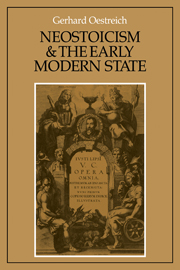Book contents
- Frontmatter
- Contents
- Foreword
- Introduction
- PART I JUSTUS LIPSIUS AND THE NETHERLANDS MOVEMENT
- PART II THE CONSTITUTIONAL DEVELOPMENT OF THE EARLY MODERN STATE
- 8 The religious covenant and the social contract
- 9 ‘Police’ and Prudentia civilis in the seventeenth century
- 10 From contractual monarchy to constitutionalism
- 11 The estates of Germany and the formation of the state
- 12 The constitutional situation of monarchy in Germany from the sixteenth to the eighteenth century
- 13 Army organization in the German territories from 1500 to 1800
- 14 The constitution of the Holy Roman Empire and the European state system 1648–1789
- 15 The structure of the absolute state
- Index
12 - The constitutional situation of monarchy in Germany from the sixteenth to the eighteenth century
Published online by Cambridge University Press: 04 May 2010
- Frontmatter
- Contents
- Foreword
- Introduction
- PART I JUSTUS LIPSIUS AND THE NETHERLANDS MOVEMENT
- PART II THE CONSTITUTIONAL DEVELOPMENT OF THE EARLY MODERN STATE
- 8 The religious covenant and the social contract
- 9 ‘Police’ and Prudentia civilis in the seventeenth century
- 10 From contractual monarchy to constitutionalism
- 11 The estates of Germany and the formation of the state
- 12 The constitutional situation of monarchy in Germany from the sixteenth to the eighteenth century
- 13 Army organization in the German territories from 1500 to 1800
- 14 The constitution of the Holy Roman Empire and the European state system 1648–1789
- 15 The structure of the absolute state
- Index
Summary
Germany in the early modern period presents an interesting picture: two opposing constitutional principles were being realized on the same soil. One of these, the corporative principle – or ‘liberty’, as it was called – carried the day on the highest political level, that is in the framework of the Empire, while the other, the monarchical principle, prevailed in the most important areas on the second level, that of territorial states which made up the Empire. This second level also accommodated a multiplicity of older feudal structures which had been left behind by the trend of constitutional development and never became states in the modern sense of the word. German constitutional history from the Middle Ages onwards is determined by this dichotomy. We observe on the one hand the decline of royal power and authority in the Empire itself, on the other the rise of the principalities, and also of the imperial cities with their republican structures. The early modern state, with its increasing monarchical authority, took shape not in the Empire as such, but within the regional states which belonged to it. I shall therefore begin my account of German monarchy from the sixteenth to the eighteenth century by considering the position of the Emperor. I shall then discuss the rise of monarchical rule in the imperial territories.
Of prime importance for the development of the Holy Roman Empire of the German Nation – as the Sacrum Imperium Romanum came to be called after 1486 – is the fact that the office of Emperor was elective.
- Type
- Chapter
- Information
- Neostoicism and the Early Modern State , pp. 199 - 220Publisher: Cambridge University PressPrint publication year: 1982
- 2
- Cited by



